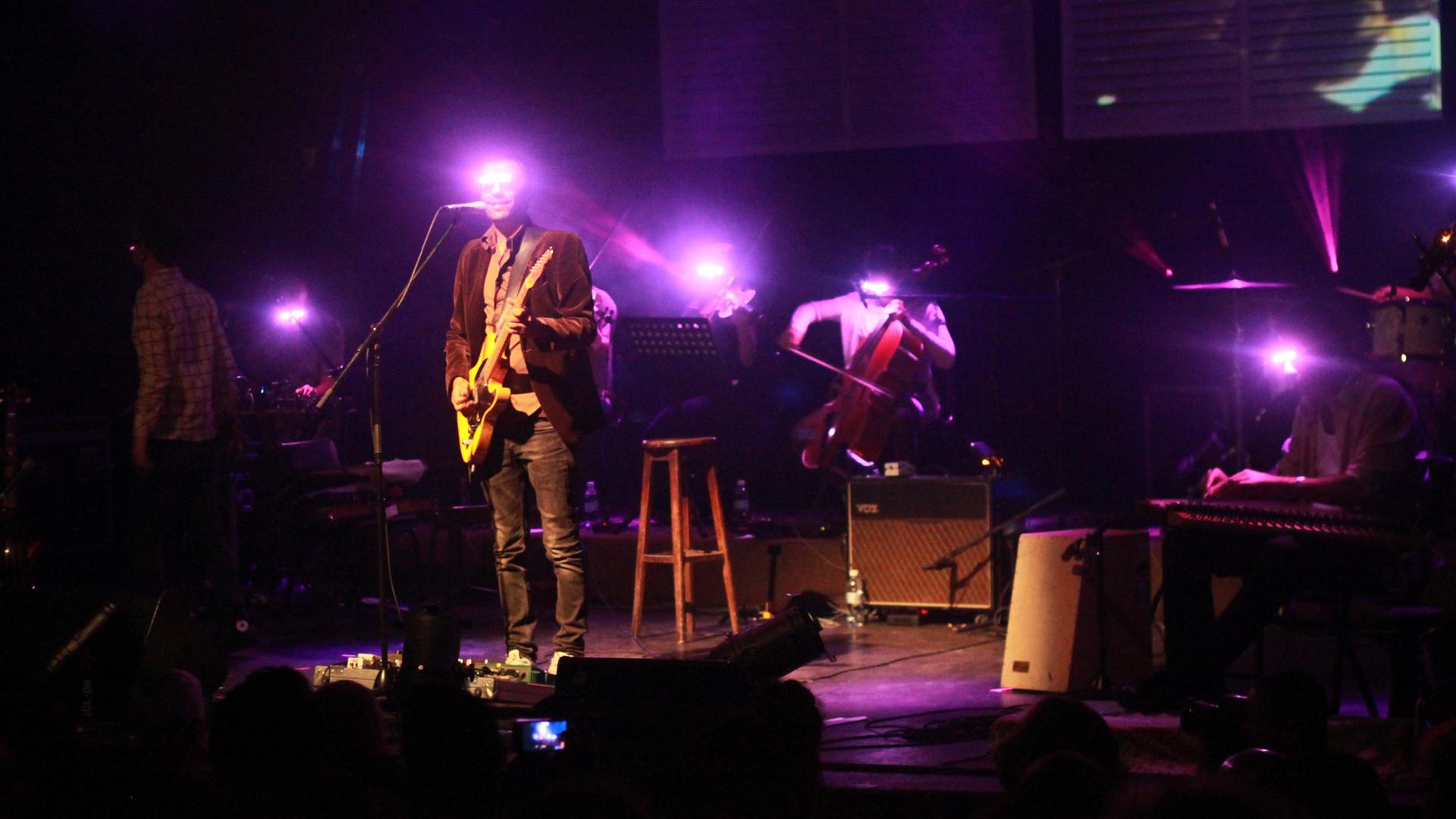An Israeli rocker sets a modern groove to his Iraqi grandfather’s Arabic music
Dudu Tassa at his concert last week in Tel Aviv playing songs from his album “Dudu Tassa and the Kuwaitis.”
Imagine if you’d heard all your life that your relatives were musicians, then one day you find out your grandfather and his brother were, say, Simon and Garfunkel.
That’s what it was like for Dudu Tassa when he finally understood that his grandfather and great uncle, Daoud and Salah Al Kuwaiti, were some of Iraq’s most important composers and performers.
“I always heard that they were big in Baghdad, but I didn’t really know how big,” said Tassa, an Israeli rock musician. “And I really didn’t care. It always seemed more like a legend.”
Growing up, Baghdad was worlds away. Tassa was into jazz musicians — Wes Montgomery, Joe Pass, Charlie Christian, John Coltrane — and rockers like Jimi Hendrix and Eric Clapton.
What Tassa wasn’t into was Iraq.
Then a few years ago, a relative emailed him a clip from Iraqi TV in 2003 on Iraqi music. An expert on the show said composers Daoud and Salah Al Kuwaiti were among the greatest Iraqi musicians of the modern era.
“Suddenly I said, 'Wow, like, this must have been something really big,'” Tassa said.
In the 1930s, the Kuwaiti brothers collaborated with Mohammed Abdel Wahab and Umm Kulthum, Arabic music’s two biggest legends. They performed throughout the Arab world and helped found Iraq’s national radio station.
But in the late 1930s and 1940s, the situation for Jews in Iraq was beginning to get dicey: authorities were firing Jews from government posts and forbidding Jewish schools to teach Hebrew. In the early 50s, Daoud and his brother left everything behind and moved to Israel.
In Israel, they hosted a weekly show in Arabic on Israeli radio and continued to compose and record music, but it wasn’t the same. Even though there were plenty of Jews in Israel from Iraq and the Arab world, Arabic music was unfashionable in the new state of Israel.
What’s more, when the Iraqi radio the brothers helped found broadcast their new music — composed in Israel — the announcers would say the songs were written by other musicians. Tassa’s grandfather died a sad man.
When he was a kid, Tassa said, his mom would sing her father’s songs and play old recordings.
“When she’d clean the house, she’d put on Arabic music and sing,” Tassa said. “She would put on the music and would cry the whole time she’d listen to it.”
Tassa was already a well-known singer and actor in Israel when he decided to tackle some of the songs that made his mother cry.
Tassa doesn’t know much Arabic, so he had to be taught what the lyrics meant. At first, he said, it was difficult for him to connect to some of the songs, with their half-tones and non-western harmonies and rhythms. But sometimes he’d stumble upon recordings of songs like one called Dalina.
“I heard it and said, what is this? This is rock and roll. This can’t be Arabic. It’s really rock,” Tassa said. “I could hear the drums and the bass coming in and playing.”
Tassa brought in a drummer and a bassist, he grabbed his electric guitar, and they recorded on top of the old recording.
“I took it to a different place,” Tassa said. “The melody and text are the same. But it’s more accessible. A lot has changed, in terms of people’s ability to listen and connect to something.”
Another old recording by his grandfather, a song called Taadini, made Tassa immediately reach for his guitar. Tassa takes the traditional Arabic melody and rhythm and turns it into a meditative lullaby.
Tassa compiled his covers in a 2011 album called Dudu Tassa and The Kuwaitis. Tassa didn’t expect people to pay any attention, but for a month and a half, his single Wen Ya Galoub played daily on Israel’s top pop station, where it’s rare to hear a song in Arabic.
It took another couple of years before the band gave its first concert in Israel dedicated to the album — a concert that was held last week.
Tassa played to a full house in Tel Aviv, with strobe lights and blasting speakers. In the audience, there were hipsters with big, bushy hair, and elderly Israelis with hardly any hair.
Israelis, particularly the younger generations, haven’t typically embraced Arabic music. That’s starting to change, as one concertgoer said.
“In my house now with my kids, I listen to Arabic music,” said a woman named Shiri. “They were very against it and hated it. ‘Mother, take this Arabic music out.’ And now my son listens to Turkish music, Arabic music.”
Tassa said he is not planning on putting out more albums in Arabic. But he said there’s something about the experience of doing covers of his grandfather’s music that sticks with him.
“I think only in recent years — really, in terms of my identity as an artist — I’m in the most real place. All of my worlds came together,” Tassa said.
In a way, Tassa could only reclaim his grandfather’s legacy to a certain degree. As an Israeli, he can’t go perform in Iraq, the country his grandfather came from.
And Tassa never met his grandfather, who died a few months before he was born.
But at least on this album, Tassa almost gets to sing with him.
We’d love to hear your thoughts on The World. Please take our 5-min. survey.
